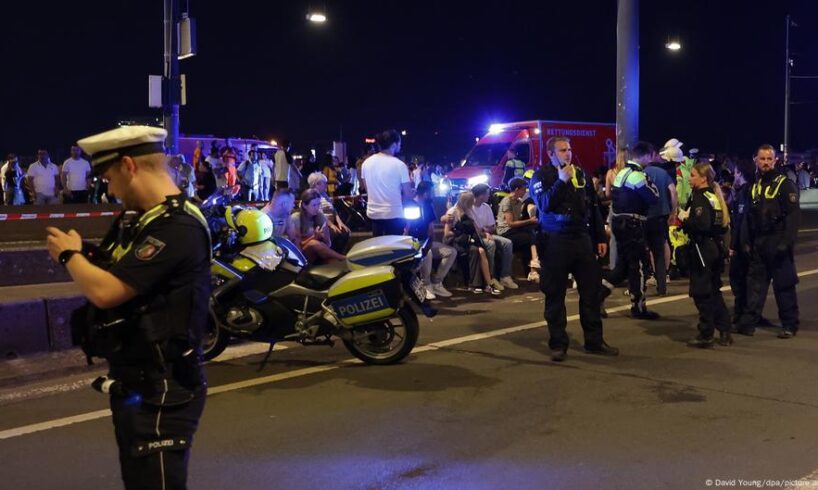
Skip next section Most Germans oppose far-right AfD ban, poll finds
07/19/2025July 19, 2025
Most Germans oppose far-right AfD ban, poll finds
A majority of Germans have opposed banning the far-right Alternative for Germany (AfD), according to a new poll.
The survey by the Allensbach Institute, published Saturday by Frankfurter Allgemeine Zeitung, found that 52% of respondents reject a ban on the party, while 27% support it. In eastern Germany, two-thirds of those surveyed said they were against such a move.
According to the researchers, one key reason is that many Germans know AfD supporters personally. In the West, 67% said they had AfD sympathizers in their social circles; in the East, that figure rose to 88%. While 54% of respondents described the AfD as far-right, only 5% viewed their acquaintances who back the party in the same way.
Another factor behind the opposition to a ban is mistrust toward the parties advocating it. Many respondents suspect those parties are mainly trying to eliminate a political rival that has grown too strong.
The idea of a ban is divisive within Germany’s governing coalition. The center-left Social Democratic Party voted unanimously at its June 29 party congress to prepare proceedings and called for a federal-state working group. The center-right Christian Democratic Union/Christian Social Union has pushed back, citing steep legal hurdles and urging a focus on political argument.
Two parties have been banned in (West) Germany, an openly neo-Nazi party in 1952 and the Communist Party (KPD) in 1956.
AfD party labeled ‘extremist’ by German intelligence
To view this video please enable JavaScript, and consider upgrading to a web browser that supports HTML5 video
https://p.dw.com/p/4xhfj
Skip next section Half of Germans see Russia as a threat, poll finds
07/19/2025July 19, 2025
Half of Germans see Russia as a threat, poll finds
Around half of eligible voters in Germany have said they agree with the federal government’s view that Russia poses a danger to the country, according to a new YouGov poll for Germany’s DPA news agency.
The survey found that 13% see a very serious military threat from Moscow, while 36% consider it a significant one. By contrast, 30% say Russia poses only a minor threat, and 14% see no threat at all.
The divide is sharp along political party lines. Among supporters of the conservative CDU/CSU bloc, center-left Social Democrats, and the Greens, 58–62% view Russia as a major or very serious threat.
About one-third of these party groups see little or no danger.
The picture flips among far-right Alternative for Germany voters, where 65% say there is little or no military threat from Russia, while 29% see one.
Among supporters of the populist left Sahra Wagenknecht Alliance, only 33% see a threat, while 51% do not.
Supporters of the socialist Left party are evenly split — 48% see a threat, 47% do not.
Germany stations troops in Lithuania
To view this video please enable JavaScript, and consider upgrading to a web browser that supports HTML5 video
https://p.dw.com/p/4xhNZ
Skip next section Meat prices remain high while pork producers feel the squeeze
07/19/2025July 19, 2025
Meat prices remain high while pork producers feel the squeeze
German consumers are paying more for meat — and prices are still climbing this summer.
And while retail costs rise, producers of Germany’s favorite meat, pork, face falling returns.
According to the Agricultural Market Information Company (AMI) in Bonn, average discount supermarket prices for a 400-gram pack of minute steaks increased by 30 cents in early July, from €3.49 to €3.79 ($4.06 to $4.41). The price for coarse pork sausages rose from €2.59 to €2.89, and a 550-gram pack of chicken schnitzel went up 30 cents to €6.26.
Meat and meat product prices have steadily risen in recent years. The Federal Statistical Office reports that, by June, they were on average 31.7% higher than in 2020.
Poultry had risen by more than 45%, and minced beef by over 68%. The German Meat Industry Association cites several causes: general inflation, rising feed costs, wage increases, and energy policy impacts.
Beef has become scarcer in Germany. According to the industry association, more farms are ending cattle production, citing regulatory pressure and uncertainty about future farming standards. The result has been shrinking herds.
Meanwhile, poultry consumption is rising.
Mahlzeit! All about German food and eating habits
To view this video please enable JavaScript, and consider upgrading to a web browser that supports HTML5 video
https://p.dw.com/p/4xhLP
Skip next section German report questions whether |Afghan deportee posed real threat
07/19/2025July 19, 2025
German report questions whether |Afghan deportee posed real threat
German authorities deported 81 Afghan nationals on Friday, part of the governments plan to send more migrants back to the Taliban-ruled countryImage: Jan Woitas/dpa/picture alliance
German media have begun scrutinizing the government’s latest deportation flights to Afghanistan, questioning whether the men truly fit the label of dangerous criminals.
One of the 81 men deported on Friday was Haroon I., 27, who was escorted from a facility in Pforzheim under heavy police presence late on Thursday.
Footage of the scene, obtained by Die Zeit, shows the emotional moment.
The report said the man was a convicted cannabis dealer who had already served his sentence. People close to him say he had been rebuilding his life and was well on his way to integrating into German society.
Die Zeit said that Haroon had strong German, was living with his partner, a German woman, had a job and was a member of his community. He also had little connection to Afghanistan with most of his family having left the country.
The convoy was guarded by police in balaclavas who kept back friends and supporters.
Pforzheim was one of the departure points for the new round of deportations to Afghanistan ordered by Germany’s centrist coalition. A plane carrying the men left Leipzig airport early on Friday.
The government has said it is delivering on a campaign pledge to deport people to Afghanistan and Syria, starting with criminals and people posing a perceived risk.
After the deportations, the United Nations said no one should be returned to Afghanistan, regardless of their legal status.
https://p.dw.com/p/4xhLv
Skip next section Firework mishap injures 19 at Düsseldorf fair
07/19/2025July 19, 2025
Firework mishap injures 19 at Düsseldorf fair
A firework explodes at too low a height above spectators during the Rheinkirmes displayImage: David Young/dpa/picture alliance
A fireworks display at the Düsseldorf Rheinkirmes — a type of town fair — has left 19 people injured, including four seriously.
Emergency services confirmed the injuries late Friday after fireworks reportedly exploded unusually close to the ground. According to police, at least one child was among the injured.
Eyewitnesses told German public broadcaster WDR that some rockets flew sideways or detonated low, with a few even landing in the Rhine River. One video from across the river shows explosions lighting up both the sky and ground at the same time.
“I was at the fair watching the fireworks,” said one witness. “Some rockets flew surprisingly low and exploded close to people. I wondered if that wasn’t too near the crowd.”
Fire officials believe some rockets may have veered off course, with one misfiring directly into the crowd.
Organizers initially kept the fair running to avoid panic but ended festivities early around 10:45 p.m. (2045 GMT). The event had been scheduled to continue into the early morning.
The Rheinkirmes fair, the biggest to take place on the river, is rooted in an annual celebration of the city’s patron saint Apollinaris. It started on July 11 and is set to end on Sunday.
https://p.dw.com/p/4xhLQ
Skip next section Red Cross warns Germany lacks crisis-ready population
07/19/2025July 19, 2025
Red Cross warns Germany lacks crisis-ready population
Germany has been falling short on preparing its population for major emergencies, according to the German Red Cross (DRK).
Millions of people need training in first aid and self-reliance, said Heike Spieker, head of the DRK’s National Relief Society.
“To build these skills sustainably, four million people would need to be trained,” she said. That level of preparedness would ensure people could help themselves and others during a crisis.
The courses, supported by federal funding and offered by aid groups, go beyond first aid. According to the Federal Office of Civil Protection and Disaster Assistance, they cover how to act when power goes out or flooding follows heavy rain.
To reach a “reasonable level” within five years, around 800,000 people would need training each year, Spieker said.
“In reality, current funding covers an average of fewer than 100,000 participants per year,” she added.
She also criticized the government’s current budget plans, saying they are “absolutely insufficient and contradict the political promises to strengthen civil protection.”
What’s a blackout?
To view this video please enable JavaScript, and consider upgrading to a web browser that supports HTML5 video
https://p.dw.com/p/4xhN7
Skip next section Welcome to our coverage07/19/2025July 19, 2025
Welcome to our coverage
A view of the DW building in Bonn [FILE: September 2016]Image: M. Becker/dpa/picture alliance
Guten morgen from the DW newsroom in sunny Bonn on the Rhine River.
You join us as news comes in of a mishap at what was supposed to be a dazzling event at the Düsseldorf Rheinkirmes on Friday night, when a fireworks display went wrong.
Emergency services said the rockets appeared to explode far too close to the ground, and 19 people were injured. According to police, at least one child was among those hurt.
Follow along for the latest on what Germany is talking about on Saturday, July 19.
https://p.dw.com/p/4xhKr





